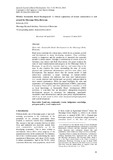Whither sustainable rural development?: A critical exploration of remote communities in and around the Okavango Delta, Botswana

View/
Date
2014Author
Kolawole, Oluwatoyin D.
Publisher
Galician Association of Researchers for Rural Development, http://www.sjruraldevelopment.org (Asociación Gallega de Investigadores para el Desarrollo Rural (AGAIDERU).)Rights
All rights reservedRights holder
©2014 Iganacio J. Diaz-Maroto HildagoType
Published ArticleMetadata
Show full item recordAbstract
Rural areas constitute the critical mass, which drives economic growth and development in many developing countries. They contribute mainly to manpower and the production of industrial raw materials needed in urban centers. Through a combination of critical review of literature, case studies and field observations, this paper explores the state of rural transformation and progress in the Okavango Delta of Botswana. It specifically examines land use and tenure-ship in the area. It also explores the issues surrounding the state of social, physical and institutional infrastructures and how these affect rural development. The analysis shows that the current model of land tenure-ship constitutes a major challenge in human-wildlife interactions. Analysis also indicates that basic rural infrastructures (i.e., social, physical and institutional) are grossly underprovided in most remote communities. While the paper highlights the roles and importance of Community-Based Organizations (CBOs), particularly Community Trusts (CTs) and other administrative structures as well as local knowledge in Sustainable Rural Development (SRD) activities, it concludes that an integrative endogenous-exogenous development process is necessary for enhancing capacitated sustainable rural infrastructures and pro-poor policy implementations, which are in turn meant to drive rural entrepreneurship/employment and local development.
Collections
- Research articles (ORI) [270]
